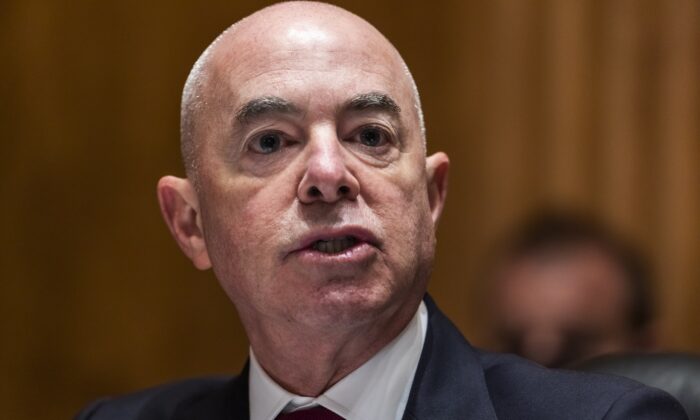Department of Homeland Security Secretary Alejandro Mayorkas is touting a raft of new programs aimed to combat domestic extremism—many of which are raising red flags among interest groups across the political spectrum.
The new DHS plans follow a March intelligence community report that deems white supremacy and violent domestic extremism as the most dangerous terror threat to the homeland. Mayorkas made similar statements at a Sept. 21 Senate Homeland Security Committee hearing on counterterrorism.
“Today, U.S.-based lone actors and small groups, including homegrown violent extremists and domestic violent extremists—who are inspired by a broad range of ideological motivations—pose the most significant and persistent terrorism-related threat to our country,” he said.
These “broad range of ideological motivations” include “racial bias, perceived government overreach, conspiracy theories promoting violence, and false narratives about unsubstantiated fraud in the 2020 presidential election,”
He didn’t elaborate on what he meant by “perceived government overreach” or “conspiracy theories promoting violence.” He did, however, assure lawmakers that his department is working hard to combat these perceived threats.
One of the major programs touted by Mayorkas is the newly branded DHS Center for Prevention Programs and Partnerships (CP3), formerly known as the Office for Targeted Violence and Terrorism Prevention. In conjunction with that, the DHS is in the midst of a $77 million grant program aimed to provide state and local institutions with tools to counter extremism.
The DHS first announced CP3 in May along with a new dedicated domestic terrorism branch within the Department’s Office of Intelligence & Analysis (I&A). Mayorkas told the Homeland Security panel that CP3 is helping expand the department’s ability to prevent terrorism and targeted violence “through the development of local prevention frameworks.”
“Through CP3, we are leveraging community-based partnerships and evidence-based tools to address early-risk factors and ensure individuals receive help before they radicalize to violence,” he said.
However, Mayorkas didn’t offer details about other elements of CP3—elements that various interest groups say pose a threat to liberty.
Among the details that weren’t discussed are what CP3 says on its own site—that it “leverages behavioral threat assessment and management tools, and addresses early-risk factors that can lead to radicalization to violence.”
According to human rights activist Ed Hasbrouck, consultant to the nonprofit Identity Project, this mission amounts to a pre-crime program.
“CP3’s attempts to predict future crimes are to be based on behavioral patterns— i.e., profiling—and on encouraging members of the public to inform on their families, friends, and classmates,” Hasbrouck wrote when CP3 was first announced.
“The problem, of course, is that the law does not permit prosecution based solely on patterns of lawful behavior,” he wrote. “With good reason: ‘precrime’ prediction is a figment of the imagination of the creators of a dystopian fantasy movie, ‘Minority Report.’”
The Brennan Center for Justice has expressed similar concerns. Far from a conservative group, the Brennan Center agrees with the DHS and FBI that domestic extremism is a rising threat.
“Over the past five years, from Charlottesville to Pittsburgh to El Paso, attacks by people who reject our multiracial democracy have shaken our country to its core and sparked conversation about how best to address far-right violence,” the group stated in a June report.
“The Trump administration, which stoked the flames of white supremacy, ended with the ransacking of the U.S. Capitol as Congress was certifying Joe Biden’s Electoral College victory.”
But the Brennan Center said CP3 and the Biden administration’s overall approach to countering domestic extremism—enhanced surveillance, profiling, and the like—are the same draconian tactics government used against Muslims post-9/11.
“At a time when jurisdictions around the country are considering how to reduce law enforcement involvement in mental health and social issues, CP3 prevention activities take the opposite approach. They create structures to bring a broad range of concerns about mental health and socioeconomic conditions to the attention of law enforcement as indicators of criminality without normal safeguards,” the Brennan Center stated in its June 69-page report on the issue.
Not only are the DHS-Biden plans a threat to civil liberties; they’re also proven to be ineffective, the Brennan Center said.
The Brennan Center report paid particular focus to DHS “fusion centers”—law enforcement compounds scattered throughout the United States that seek to integrate federal, state, and local intelligence. The goal of fusion centers is to create partnerships between varying agencies and the private sector to share intelligence on threats to public safety so law enforcement has the whole picture and can “connect the dots.”
Citing congressional reports from 2012, the Brennan Center stated that these fusion centers have proven to be ineffective. Those reports found that the DHS spent $289 million to $1.4 billion in public funds to support state and local fusion centers since 2003, with little results to show.
“Instead of looking for terrorist threats, fusion centers were monitoring lawful political and religious activity. That year, the Virginia Fusion Center described a Muslim get-out-the-vote campaign as ‘subversive,’” the Brennan Center stated in its June report. “In 2009, the North Central Texas Fusion Center identified lobbying by Muslim groups as a possible threat.”
Seemingly little has improved since then.
Earlier in September, NBC News revealed an investigation into fusion centers. The report starts with an anecdote of Mike Sena, the president of the National Fusion Center Association, bragging that the Northern California Regional Intelligence Center (NCRIC) helped stop a mall shooting attack in Santa Clara.
NBC News found that Sena was apparently stretching the extent to which his fusion center helped.
“We don’t have any information showing that NCRIC was involved,” said Steven Aponte, a San Jose Police Department spokesperson.
The Brennan Center stated in its June report that the Biden administration is inappropriately involving law enforcement in social problems and should focus on “community investment, not criminalization.”
“Communities around the United States should not need to sign up for a counterterrorism program to get resources for their schools, universities, places of worship, or social institutions,” the Brennan Center stated.
“Government commitments should directly address these as social problems rather than treat those experiencing them as potential violent criminals, and should wall off programs addressing social ills from law enforcement across levels of government.”

